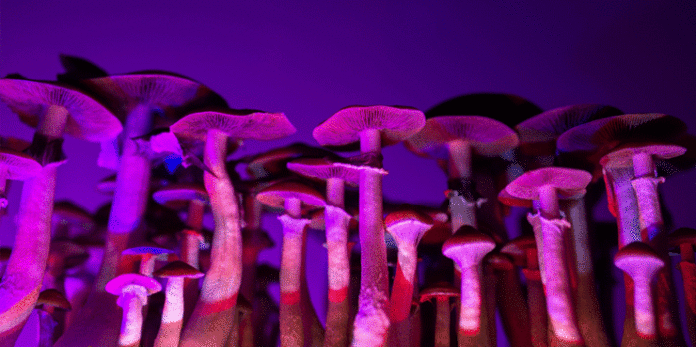The psychedelics industry is booming, with research on compounds like psilocybin and MDMA resurfacing after years of neglect amid the war on drugs.
Even sales of non-psychedelic mushrooms have spiked. Common mushrooms like button, shiitake, oyster and chanterelles have experienced a major upsurge in demand. Valued at nearly $2.3 billion in 2020, experts project the compound annual growth rate of mushrooms to be 9.3% from now until 2030.
Psychedelics Research
This accruing curiosity in the psychedelics space can be largely attributed to consumers’ growing interest in health. While many turn to marijuana to help aid with certain ailments, more research is being conducted on how other psychedelics can be used as treatments.
For example, the Johns Hopkins Center for Psychedelic and Consciousness Research is leading the way in exploring innovative treatments using psilocybin. The molecular structure of psilocybin, a naturally occurring psychedelic compound found in ‘magic mushrooms,’ allows it to penetrate the central nervous system. Scientific and medical experts are just beginning to understand its effects on the brain and mind and its potential as therapeutics for mental illnesses.
Previous studies by Johns Hopkins Medicine researchers showed that psychedelic treatment with psilocybin relieved major depressive disorder symptoms in adults for up to a month. In a follow-up study of those participants, the researchers report that the substantial antidepressant effects of psilocybin-assisted therapy, given with supportive psychotherapy, may last at least a year for some patients.
In a webinar discussing the psychedelics industry, Bethany Gomez, Managing Director, Brightfield Group, said that 7.5% of all American adults have used psychedelics in the last five months, and 24% of American adults use cannabis. When you break that down, psilocybin is the most common product, followed by MDMA, functional mushroom supplements and Ketamine.
The Legal Stance on Psychedelics
“From a federal standpoint, cannabis and classic psychedelics are all still classified as schedule 1 substances,” Courtney Barnes, Counsel, Feldman Legal Advisors PLLC, said in the webinar. “MDMA will be the first psychedelic compound to receive FDA approval within the next 10-12 months, and Ketamine is a schedule 3 compound, so it is already available for prescriptions.”
At the federal level, Barnes said that all schedule 1 drugs have a significant medicinal impact. At the state level, some are enacting measures that will allow residents to go to healing centers to purchase psychedelics and use them under the supervision of a trained facilitator. Consumers can’t take the drugs home with them – they must be used at these facilities under supervision.
There are some states that have been making progress in the psychedelics industry. On September 15, The California legislature passed Senate Bill 58, which decriminalizes the possession and personal use of psilocybin, psilocin, DMT and mescaline. If Gov. Newsom signs the bill, California will become the third state in the nation to decriminalize psychedelics, following behind Oregon and Washington D.C. There are select cities in certain states that have also decriminalized psychedelics.
“Similar to cannabis, we have created a psychedelic policy reform movement. Since 2019, we now have at least 23 cities that have passed some sort of decriminalization initiative. A deep prioritization measure isn’t a get out of jail free card, and there is still a risk engaging in psychedelic activities,” Barnes said in the webinar.
Pairing Cannabis With Functional Mushrooms
With the rise of the functional mushrooms space and the alleged health benefits, these products would do great in dispensaries alongside cannabis merchandise for medical customers. Chris Claussen, Co-Founder, First Person, said in the webinar that dispensaries can complement their existing product lines with functional mushrooms.
“There is huge potential for this in the cannabis industry,” Claussen said. “I would concentrate on the three big functional mushrooms: lion’s mane, cordyceps and reishi. Lion’s mane is an anti-inflammatory and protects the brain, and reishi is known to help sleep and can be paired with CBD.”
Gomez said that in a very saturated market, such as cannabis, adding functional mushrooms to your product line can help your brand stand out and even bring in new customers.
“The hemp and CBD market can be incorporated with functional mushrooms, and there can be great success there. It’s great for consumers who want to try new products, as well as drawing in new clients. In cannabis, everyone is experimenting with different cannabinoids, but there are only some who are dabbling with functional mushrooms, so it’s a great opportunity for brands to consider.”










